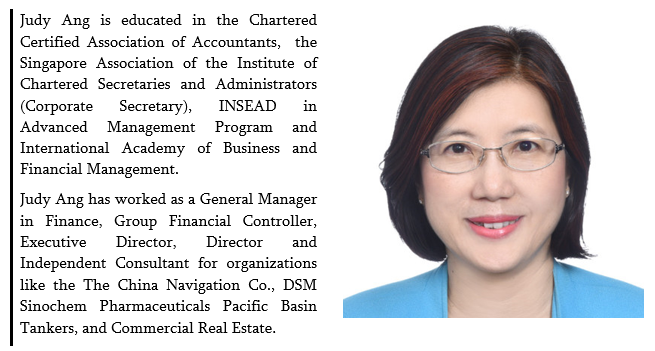At Q7 Consulting, we are aware that Change happens faster and more frequently than ever. As a result, Change Management and Leadership within organizations are essential pillars for success.
The people we interview are from all around the world, have outstanding professional trajectories and attained success within their roles. They have essential leadership traits, are influential within their organizations and have experience implementing and managing Change.
In this ninth episode of our new series, we interview Judy Ang, independent Accounting and Finance Consultant with great experience leading teams in Singapore, applying her knowledge in accounting and finance to effectively execute Change in organizations.

Please find below the main questions addressed in our interview with Judy Ang and her answers to the same.
What have been your takeaways from managing Change?
I have been working on a couple of projects including managing Changes. The main takeaways are that all projects are different and “there is no one size that fits all”. Also, the technologies and degree of digitalization is not the same for all organizations. We need to learn flexibility and be open-minded to look at different angles. Lastly, to enjoy the benefits of Change (higher revenue, lower costs).
An attitude of “yes, we can do it” is very important.
What is your advice to people who start managing major Changes in organizations for the first time?
Find the right partners when you don’t have the specific expertise to meet the goals. Proper planning is also very important, coupled with clear objectives based on “why do you need the Change?”. The project will not succeed without the commitment from the team.
Communicate, communicate and communicate, because Change is a long process. Training and mentoring with a post-implementation review are keys to evaluate what worked and what didn’t work.
What was your role in making Changes in the organization and were the Changes clearly linked to the mission and vision of the company?
I’m specialized in finance and accounting. Many projects involve corporate restructuring, systems change and making things work better. I think that once you rollout a Change, people are happy because they see how efficient things are after rollout in contrast to before rollout. This gives a good sense of achievement and clearly links to the mission and vision of the company.
How did your company support you in getting ready to lead / manage Change?
Before you can get management to support you, you first need their consensus and buy-in. There is always room for discussion to tackle issues with different ways to solve them. The willingness to be involved is a key sign that they are fully supporting you.
What strategies worked and did not work to communicate the Changes and what strategy did you use to generate a sense of urgency with people?
You need to work and help people to generate the sense of urgency. Understand that they have their day-to-day job. A good communication plan is important, specifying the steps of what is happening and what is going to happen. Also, constantly follow-up with people to know their issues and free time up for testing. Buying a small cake may go a long way to celebrate achievements!
What may not work if you have uncommitted stakeholders and do not communicate well that may end up transmitting a negative message to people.
How did you approach planning Changes? How well were the Change plans followed and how did you approach Changes to the plans?
Try to break up into various teams so you have several groups to tap into their expertise. If things are not working well then sit back, reflect and try again. For any sort of change you need to have a Plan B, use it and do not get discouraged. This is very important to manage any deviations.
What strategies did you use to attain milestones and make achievements visible?
When we are managing milestones, you need to consistently engage the team so that members follow the time frame given. You need to plan resources to avoid bottlenecks and hold back. You need to manage fear and resistance through counseling, training and getting the right people for the project.
What did you do to keep people committed? What did you do to keep people from going back to old ways?
As a first rule, you need to search for people who WANT to work on the project. I am a fan of technology and digitalization, so leveraging the right technology for the project can be the difference between heaven and hell.
Top management should always be involved and be committed, not only the project team. For me, post-implementation is also very important, do not stop when the Change rolls out. If you don’t train and address people’s questions or listen to them, then people will go back to old ways.
Did you underestimate or overestimate what was needed to be done to achieve Change?
So far I would say that I have been lucky, I usually don’t have issues. I completed my projects within the forecasted time frame. In my last project I was ahead of the game one month before the timeline.
What worked and what did not work in planning and executing Changes?
You need to set the expectations, and once you set them, you need to be prepared. As I said, in any sort of projects you need to have communication skills to breach any misunderstandings and expectations from the teams. You also need to have good vision and foresight to predict where the next obstacle will be. As an accountant, I am always very conservative, setting a realistic timeline and a Plan B. The right committee, support and commitments are key factors to succeed.
To conclude with my personal experience, I recommend finding the right partners and engage them to manage the Change, because Change is not easy especially for big projects. Tapping on external experience and expert help a lot.
